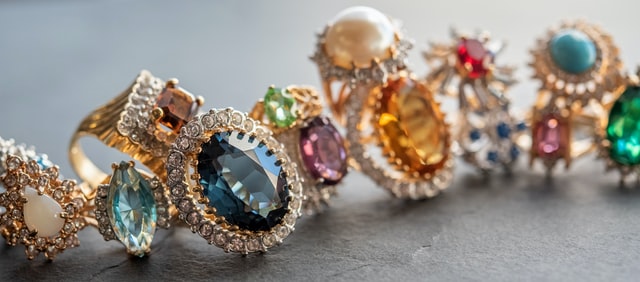The chances are strong that all of your jewellery, from your everyday products to those stately jewels you usually wear on rare occasions, may benefit from a thorough cleaning and buffing. Some people clean their jewellery on a regular basis, while others only clean their jewellery when necessary. Because baubles are worn-and-tumbled goods that can be delicate, it’s advisable to use a gentle approach when cleaning them.
Too much washing and rubbing can result in unneeded damage and early wear, while too little washing can result in the degradation of your prized possessions over a period of time. Here are a few tried-and-true procedures and recommendations to help you maintain your jewellery safe and looking beautiful.
Preventative and curative measures
To start, designate a place in your home where you can leave your rings and other valuables while performing household chores such as washing dishes, gardening, or cleaning. The majority of individuals are accused of leaving their wedding bands on all the time, but they should be taken off if there is a possibility of their getting wet or soiled. When you are taking a bath or using hand lotion, you should remove your jewellery completely.
If you don’t, soap residue and moisture might become trapped in the crevices of your jewellery, causing problems down the road. Avoid premature tarnishing of silver by putting it in a felt bag separate from other jewellery and metals, such as gold.
Keeping Your Jewelry in Good Condition
After that, determine what kind of jewellery you want to clean. Every piece of fine jewellery should be cleaned with care, but some gemstones demand a gentler touch in order to avoid cracking or chipping them. Especially delicate items such as pearls and cameos formed of shells, emeralds, opals, and turquoise should be handled with extreme caution. Most fine jewellery should only be cleaned every two months or so in order to avoid unwanted exposure to liquids and other contaminants.
If you find yourself cleaning your jewellery on a more regular basis, make sure to utilize a gentle manner and avoid using ultrasonic cleaners or steamers.
Jewellery Care and Cleaning
Home cleaning of jewellery is the most did try and mild solution possible. All you need now is a dish, tepid water, a soft bristle toothbrush, and a light dish detergent to accomplish this task. The soap should be as mild as possible. This DIY jewellery cleanser can be made using the following ingredients: Dish soap and lukewarm water are mixed in a small bowl to make an effective cleaning solution. To clean heavily filthy fine jewellery without the presence of precious stones, immerse the jewellery for a few minutes in the liquid.
Always please remember that delicate jewels must never be immersed in water for more than a few of seconds. After that, gently scrub away any debris or waste with the toothbrush. A toothpick can be used to gently loosen debris from difficult-to-reach areas. Keep track of any loose stones or damage that has to be repaired while you’re cleaning the jewellery.
Silver Jewelry Should be Cleaned
Silver jewellery can be cleaned with a silver polish, which you can purchase or create yourself from tinfoil, baking soda, salt, and water. Use shining side up aluminum foil to line the bottom of a big throwaway baking dish. After that, arrange the jewellery in the pan so that it touches the aluminum foil on both sides. Toss some baking soda and salt into the pan and bake for 15 minutes. If you are using a lot of water, the amount of salt and baking soda you use will vary.
A tablespoon of salt and one teaspoon of baking soda for every cup of water is a good rule of thumb. Afterwards, fill the pan half with hot water until the jewellery is completely submerged. Allow the jewellery to soak in the solution till the tarnish begins to fade and become unnoticeably lighter in colour. Then, using a sticky gunk cloth, carefully remove the jewellery and pat it dry completely.
Foil made of aluminum
Here’s how to use aluminum foil to clean your jewellery: Immerse the jewellery in the solution for one minute to allow it to absorb up the chemicals. Allow to air dry after thoroughly rinsing. When cleaning silverware with this method, you use a chemical process known as ion exchange, that you can find out more about here.
Sodium bicarbonate
Gently work the product in with a wet sponge before rinsing and buffing it dry. Using a light coating of baking soda, rub the jewellery in a little amount of vinegar, and then rinse it thoroughly to remove the baking soda. Take note that this approach should not be used with jewellery that contains pearls or jewels since it may damage the finish or loosen any adhesive that has been applied to the piece.
Vodka
Any type of glass or jewellery containing crystalline gemstones could be cleaned with just a few drops of vodka in a pinch. As a final caution, keep from getting any alcohol on any gemstone that isn’t a clear crystal. It is only precious stones such as diamonds, emeralds, and the like that will benefit from soaking in vodka.
Cleaner of windows
Jewelry made entirely of metal or containing crystalline gemstones such as diamonds or rubies can be spruced up by cleaning it with window cleaner. Use an old toothbrush to clean up after spraying the cleanser on. Unless the piece contains opaque gemstones such as opal or turquoise, organic jewels such as coral or pearl, you should refrain from doing this.
Shampoo
Rather of soaking your pearls, try this simple approach to clean them without risking damage to the strands. Shampoo and warm water should be mixed together. This approach works best when a small brush such as a cosmetics brush is being used to polish each pearl with a tiny portion of the mixture.


